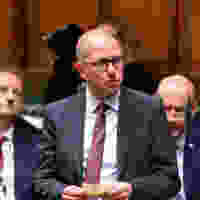
We can't blame the desperate for the failures of the powerful
Walk through any town in Scotland and you will see it – the signs of a country in decline. Overgrown parks, shuttered shops, crumbling pavements. Speak to the people who live there and you will hear the same questions asked again and again: “Why is everything falling apart?”, or, “Why is life getting harder with bills rising but wages remaining the same?”
These are not abstract concerns. They are the lived reality of millions across the UK. Families struggling to put food on the table – often even with mum and dad both in work. Child poverty in Scotland is rising. Nearly one in four children now live below the poverty line. That is not just an official statistic – it is a national disgrace. It means families relying on foodbanks. It means futures being stunted before they have even begun.
During the past nearly decade and a half, we have seen people made poorer by design in what we have come to call Tory austerity. We have also seen a pandemic, with the rich accelerating further away from the working class, and a cost of living crisis which is still raging on.
In the face of all of this, it is easy to point the finger to a vulnerable group, saying they are the source of all problems. Unfortunately, history often repeats itself and it seems like we never learn from the mistakes of the past.
Let me be clear: migrants are not to blame for the state of our country. They did not cut council budgets. They did not privatise public services. They did not create the housing crisis or drive down wages. The blame lies with the powerful – with the super-rich, with corporations, and with the politicians who have enabled them.

But this is not just a Westminster phenomenon. The SNP has created its own brand of austerity in Scotland. Year after year, councils have been handed shrinking budgets and told to do more with less. Utilities have been sold off. Financial mismanagement has left local authorities scrambling to keep the lights on. What this means in practice is that councillors – regardless of party – are increasingly reduced to being SNP agents at a local level. They are forced to implement decisions made in Edinburgh, with little autonomy and even less funding. The result? Vital services cut to the bone. Communities left behind. And a growing sense that local democracy is being hollowed out.
And while working families tighten their belts and councils struggle to keep basic services running, the wealthiest in society continue to prosper. The last decade was not just marked by economic hardship – it was defined by a deliberate transfer of wealth upwards. The rich did not just survive the 2010s; they flourished.
One of the clearest indicators of this growing divide is the explosion in foodbank use. In 2010, tens of thousands relied on emergency food parcels. Today, that number has surged into the millions. This is not the result of immigration. It is the consequence of a political and economic system designed to benefit the few at the expense of the many.
Housing has been turned into a speculative asset, not a basic right. Energy firms post record profits while families ration heating. Executive pay continues to climb, while wages for ordinary workers stagnate.
And yet, instead of confronting the architects of this inequality, some people choose to deflect. They target migrants, stir up resentment, create divides and distract from the real sources of hardship. They would rather have us blame the desperate than challenge the powerful.
Do not fall for it. Migrants did not dismantle public services. They did not engineer austerity. So let us stop blaming the powerless. Let us start demanding accountability from the powerful instead.

Brian Leishman is the Member of Parliament for Alloa & Grangemouth.














